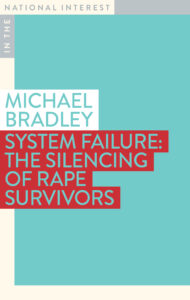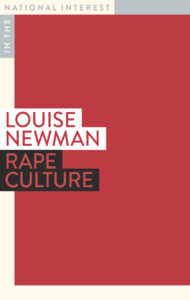Content notification: This post contains discussion of rape culture, sexual assault and silencing victims.
I’m back again to review two more books from the In the National Interest series – the bite-sized deep dives from Monash University Publishing.
Sticking with the theme of exploring the hellscape that is life in Australia for women these days, I read System Failure: The Silencing of Rape Survivors by Michael Bradley and Rape Culture by Louise Newman. I want to acknowledge up front that these are heavy going topics, and both books needed a trigger warning – System Failure includes graphic depiction of rape, while Rape Culture includes detailed accounts of the psychological distress of survivors.

Michael Bradley says we offer rape survivors a stark choice: go to the police, or remain silent.
Like those I reviewed earlier, these books are easy to get through. System Failure especially is a good starting point for those wanting to know more, or who are thinking about these issues for the first time. Unlike the other books, though, System Failure deliberately does not propose any solutions, rather, Michael Bradley states ‘What I want to point out is that the failure exists, that it is profound, complete and absolutely known.’
The book does an excellent job of laying out the historical origins of rape as a property crime against men (!), the system’s inability to deal with nuance and contradiction in intimate relationships, and the traumatizing – and often fruitless – process of justice seeking.
But with no solutions posed, we’re not offered anywhere to go with all this. I suppose there are some people who don’t know the system is cooked and so need to hear this – but I am not one of those people and so I was deflated from spending more time dwelling on the horror.
I would have liked more unpacking of how the intersection of ‘the system’, patriarchy, and gender norms act on men and women to normalize sexual violence, to make consent so tricky, to heap shame on women, or of the particular challenges faced by diverse women, and trans and non-binary people, but at 85 pages there’s only so much that can be covered.
Overall, if you don’t yet realize that the whole damn system is wrong, this is a great place to start. But if you are acutely aware of this, maybe give this read a miss.
I thought there might be some of the exploration I was seeking from System Failure in Rape Culture, but no. Rape Culture is more about the psychological trauma of experiencing sexual violence and living in rape culture than it is about unpacking rape culture itself.
When I realized this, I was excited to dive into an exploration about the need for psychological theories that recognize that humans, especially minoritized and marginalized humans, live in political, economic, and social systems that can be traumatizing and cause psychological harm.

Yet again, women’s testimonies are discredited, says Louise Newman.
The book left me wanting more – though again, at 82 pages, and attempting to connect some big ideas, it was only ever going to skim the surface. And while I’m not sure that the connection always lands, Louise Newman does offer important solutions, summed up as ‘We need gender-specific models of care and treatment for the enormous range of mental disorders and psychological issues stemming from rape culture…’ Can I get an AMEN?
Engaging in this material requires some radical self-responsibility – knowing what our limits are at any one time and establishing some supports for ourselves when we do engage. So, I would exercise caution in whom I recommended these to – these are thought provoking contributions, but you will have to deal with those thoughts. Ultimately, these authors clearly care deeply about their subject matter and write engagingly and it’s comforting to know that these passionate people are out there doing their thing.




